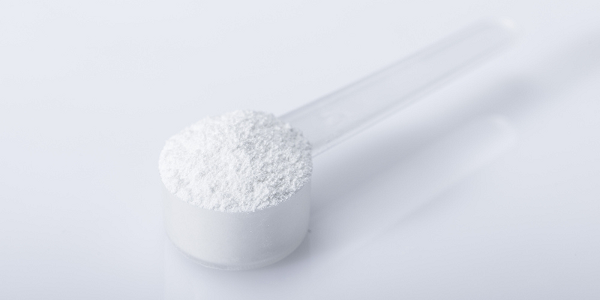
Sodium Alginate is the sodium salt of alginic acid and gum, mainly derived from the Phaeophyta brown algae or seaweed cell walls. When ingested orally, it binds to and inhibits the absorption of certain radioactive isotopes.
Sodium Alginate is often used as a hydrogel in biomedical applications, such as wound healing, medication delivery and tissue engineering. It serves as a stabiliser, thickening, and gelling agent, giving food its viscosity and producing heat-stable gels.

Table of Contents
Production of Sodium Alginate
The salt is produced when sodium carbonate interacts with alginic acid. The cell walls of brown seaweed contain naturally occurring alginic acid and its salts (primarily magnesium, calcium, and sodium). Macrocystis, Ascophyllum, Durvillaea, Ecklonia, Laminaria, Lessonia, and Sargassum are seaweed used to manufacture alginic acid.
The following steps comprise the production process:
- The seaweed is washed with water and acid to remove water-soluble compounds, including sodium chloride, mannitol, potassium chloride and soluble proteins.
- Alginic acid and calcium alginate are transformed into soluble sodium alginate by adding sodium carbonate and sifting away cellulose.
- In the subsequent stage, sodium alginate is changed to alginic acid with the addition of acid or calcium chloride to generate calcium alginate. Then, it is cleaned with acid.
- The neutralised sodium carbonate is next dried and formed into granules.
Sodium Alginate Uses
Sodium Alginate has numerous applications. Some of them are as follows:
- Due to its inherent gelling, thickening, and stabilising qualities, Sodium Alginate is used to produce frozen dairy products such as ice cream, yoghurt, pudding, sweets and cheese sauce.
- It is notably helpful in producing Gelato ice creams since it stabilises the ice cream’s air bubbles and prevents the creation of sugar crystals. The ice cream resembles a gel.
- In the production of certain meals, sodium alginate encapsulates the food’s colour and flavour. Sodium alginate is combined with calcium chloride to gel the sodium alginate by forming calcium ion beads.
- Sodium alginate can be used to texturize meat to retain water and elasticity in the meat products and to give the products a smooth finish. Here, calcium ions and sodium alginate form a gel of calcium alginate that retains the meat’s moisture.
- Sodium Alginate can be used as a nutritional supplement to satisfy the body’s energy and hunger requirements. Sodium alginate, konjac glucomannan, and xanthan gum are combined to provide the fortified element in meals and elements.
- In several medicinal preparations, sodium alginate is used to minimise the reflux of stomach content.
Benefits of Sodium Alginate
- As a non-digestible carbohydrate, Sodium Alginate reduces blood sugar, blood pressure and cholesterol levels, among others.
- It can also thicken or gel water.
- It could be listed as a dietary fibre.
With gel formation, viscosity, and solubility features, Sodium Alginate is a versatile substance with numerous applications.
Anzen Exports: Revolutionizing Healthcare
Anzen Exports is a merchant export organisation that manufactures APIs, Finished Dosage Formulations, and the development of Nutraceuticals and Nutricosmetic products. They have successfully provided services to approximately 500 companies in over 70 countries worldwide, with a group turnover of over USD 70 million. With 31 years of experience in this industry, Anzen helps to provide its clients with the best service.
For over three decades now, the company has been instrumental in introducing high-quality products and services in pursuit of its mission to save and improve lives. Scientific excellence and a diverse workforce that values collaboration are the cornerstones of the success of this dynamic brand.
For more details, visit www.anzen.co.in
Disclaimer:
Anzen Export’s blog posts have been written with information gathered from approved medical journals and websites online. Our research and technical team strive to provide relevant information through such articles. To be best informed, we advise consulting a doctor about an ingredient or medicine before taking it.
References
- https://nutritiondaily.in/blogs/news/sodium-alginate-uses-and-benefits
- https://www.sciencedirect.com/topics/chemical-engineering/sodium-alginate
- https://foodadditives.net/thickeners/sodium-alginate/

